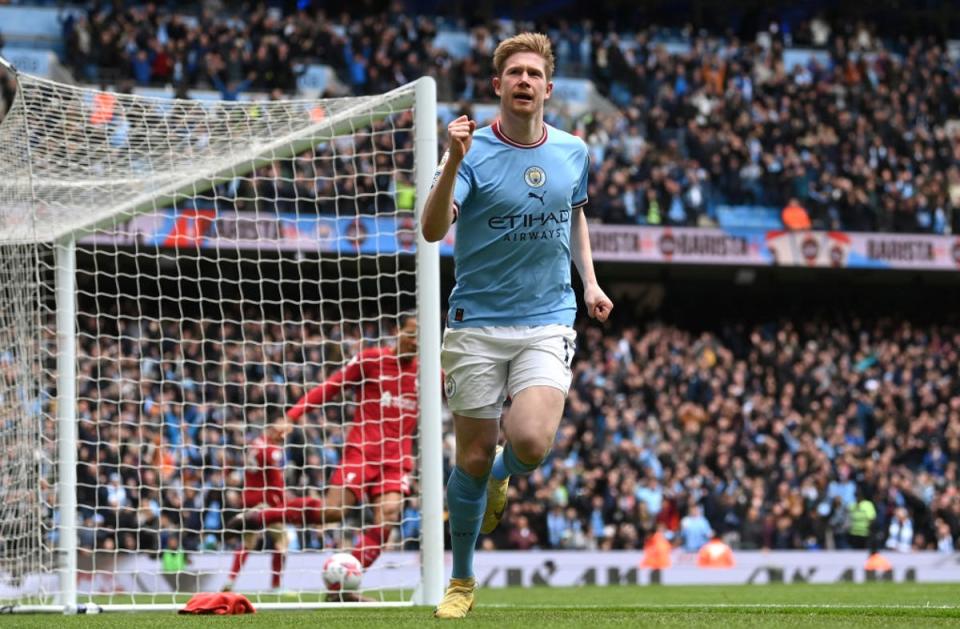Julian Alvarez roves and revels to underline status as world’s best second-choice striker

Erling Haaland was bounding around in celebration. Manchester City’s striker had just equalised against Liverpool and their top scorer’s joy was evident. But the 42-goal man was in the executive boxes, the City player nearest him a 1990s midfielder, in his father Alf Inge.
The forward and finisher on the pitch was Julian Alvarez. On a day to suggest the World Cup winner may be the world’s best second-choice striker, City had few reasons to regret Haaland’s absence. His antics in the plush seats suggested his groin problem should not sideline him for long, but if City are to retain their Premier League title, it will owe much to a tour de force from his deputy.
Alvarez scored City’s first goal, made their second and had a prominent part in the third. By the time Jack Grealish scored the fourth, a deficit had been turned into an emphatic 4-1 victory.
The Argentine was the catalyst, bringing a more unobtrusive brand of brilliance than Haaland’s, a shorter figure standing in for the blond giant, yet a less visible figure showed a side to his game that even the potent Norwegian may not possess. City took the lead through Kevin de Bruyne, but after a pass of De Bruyne-esque brilliance, a diagonal ball sprayed from the centre circle by Alvarez.
Not for the first time, the temptation was to wonder why, besides a suitably large pay rise, Alvarez recently signed a five-and-a-half-year deal when he will often start games of this magnitude on the bench. Drafted in when Haaland was ruled out, he demonstrated his aptitude for the big occasion.
In the process, he enabled Pep Guardiola to defeat the man he has deemed his toughest-ever opponent, Jurgen Klopp, while condemning Liverpool to a third straight defeat. If City helped knock Liverpool out of contention for a Champions League place, victory will serve them another benefit.
It was nevertheless a game of coruscating brilliance, the pace and drama illustrating why it has become English football’s modern-day Clasico. Perhaps it was a tale of three strikers: Haaland, Alvarez and Mohamed Salah, relocated from the right wing, putting Liverpool ahead and becoming their first-ever player to score in four games against City in a season. It ended up a statistical footnote nonetheless and if that was partly due to Alvarez, it also reflected De Bruyne’s virtuosity.
Take Haaland out of a team and there are different dynamics. If there was a vacancy for a leading man – and Guardiola’s focus on the collective means he may object to the idea – De Bruyne filled it.
Indeed, he was primed to. City’s side was shaped around him: 4-2-1-3 out of possession, 3-3-4 in it, with the Belgian unleashed to go wherever he wished. It was why he popped up on the left wing to set up Grealish’s goal and was the most advanced player when he converted Riyad Mahrez’s cross. His goals have been rarer this season as he had adapted his game to supply Haaland.

Take Haaland out, however, and he made a burst into the box that was reminiscent of Steven Gerrard in his prime. But if it is nothing new that Liverpool’s midfield provide fewer goals than City’s, it was nevertheless summed up when Ilkay Gundogan, the scorer in a Champions League final for Klopp’s Borussia Dortmund, made it 3-1. It was City’s second goal in eight minutes after half-time; for Liverpool, there was no way back.
For the fourth time in 2023 alone, they lost by three goals. Once again, they were overwhelmed; a side that had begun with purpose seemed stretched, almost shambolic. Alisson had to embark on another damage-limitation exercise.
Yet Liverpool had led. Salah was electric in the first half, relishing the gladiatorial element of being sent out to take on the City defence on his own as he led the line. Liverpool struck from a quick break: Diogo Jota sprang the offside trap from Trent Alexander-Arnold’s pass, was held up but teed up Salah, and he swept a shot into the top corner.
They only had 10 minutes to savour an advantage. Then City switched play from one flank to another, Alvarez arriving in the middle to finish from Grealish’s first-time cross. It was the provider’s second decisive contribution in a minute: he had just made an invaluable intervention to stop Salah picking out Jota at the other end.
City’s second was the piece de resistance: Alvarez’s sweeping pass, the direct, dangerous Mahrez’s terrific cross, De Bruyne’s first-time finish. When the Argentinian then had a shot blocked by Alexander-Arnold, Gundogan converted the rebound. When De Bruyne got behind Alexander-Arnold and cut the ball back, Grealish steered in the finish his contribution deserved.
For City, it was a seventh straight win, the only stroke of fortune coming when Rodri escaped a second booking in swift succession in the first half. But they had been deprived of the player who scored eight goals in their previous two matches and dispatched the team managed by their nemesis. Then again, it helps when Haaland’s stand-in is Lionel Messi’s sidekick.

 Yahoo Sports
Yahoo Sports 
